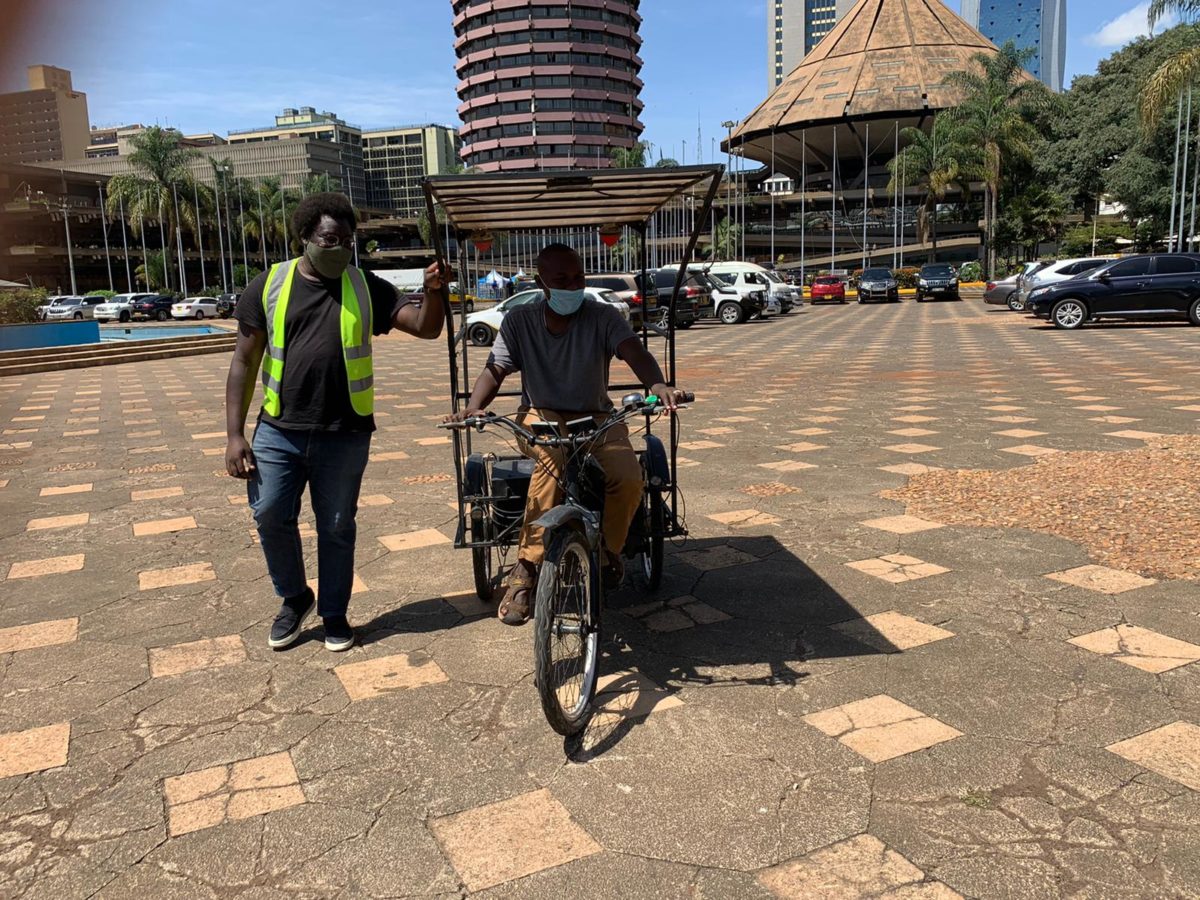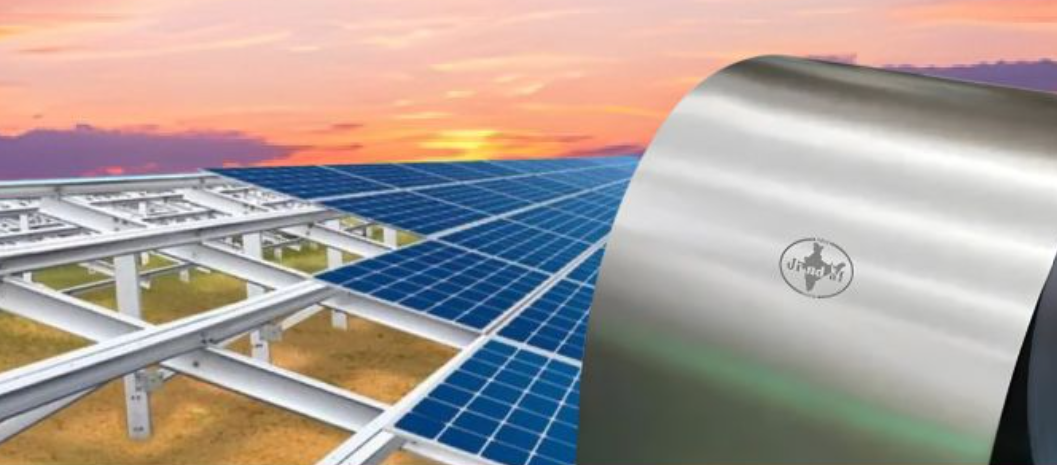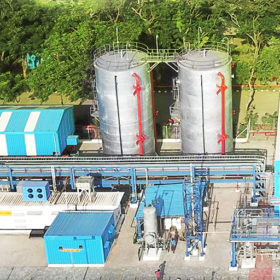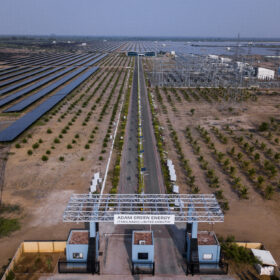From pv magazine 07/2020
Kenya’s State Department of Transport reports that 13% of the country’s national greenhouse emissions come from its transport sector, and more than half of the total registered vehicles in the country are motorcycles. Hence there is a need to reduce emissions by accelerating the deployment of EVs and other alternatives.
A Kenyan startup company, Solar E-cycles, has developed a solar-powered tricycle which is targeting access to sustainable mobility and electricity for productive use in rural offgrid communities. And the advantages don’t only come in the form of reduced emissions.
Increasing many Kenyan’s mobility in an affordable way can directly improve access to daily needs such as water, food, fuel, and services such as education and health. Household revenue opportunities also expand as markets can be accessed – increasing income and allowing people to participate in a range of both social and economic activities. Isolation, it could be said, is a road to nowhere for many.
Solar E-cycles
The motorized tricycle being developed by Solar E-cycles is charged by a 300 Wp semi-flexible PV module, produced by Shenzhen Shine Solar Co., using SunPower IBC cells. The module is coupled to a 48 V lead acid battery. The company claims the tricycle can travel 50 km to 100 km on a full charge. The tricycle takes an “assisted cycling” approach – meaning that pedals are still required. It can be described as a solar+human hybrid, with control settings to adjust the electrical and human pedaling input needed, although by default it is set at 70% to 30%. To get the bike up and running requires the most leg work, but once in motion, Solar E-cycles CEO Alex Makalliwa says a rider can easily relax their feet in place.
“A lot of people have not driven three-wheeled cycles, the feel of it is very different,” says Makalliwa. “You have to be aware of how the tricycle moves, especially users transitioning from bicycles – they tend to lean towards one side, thinking they will be able to steer the tricycle this way which is completely unnecessary.”
The flexible modules used come at a cost that is three times higher than the alternative conventional module. Despite the cost, Makalliwa says they are the right choice for the tricycle design in that they are lightweight and flexible – perfect for mounting on curved frames. Also, riding on rough terrain requires solar PV modules that are free from cell cracking, which is delivered by the flexible, plastic encapsulation. Given the high-powered module, the tricycles require only a three- to four-hour charge once the battery has been fully depleted.
The tricycle’s design has incorporated a number of features. It boasts a cargo capacity of 200 kg, with an additional electric capacity of 1.5 kWh per day. The cargo space can be used to carry and transport anything within the weight capacity while the extra electricity can power external DC or AC loads with an additional inverter.
Future improvements planned by Solar E-cycles include an upgrade of the cargo space to 300 kg and a replacement of the lead-acid battery with lithium-ion. It is planned for the frame of the tricycle to be improved in order to easily navigate difficult paths and roads, which is the current road infrastructure situation in rural villages across much of East Africa. Speed levels will also be reduced due to speed limits in the country relating to e-cycles. Currently, the tricycle’s speed is 45 km/h, to be reduced to 20 km/h.
Makalliwa describes the potential productive use and interest in Solar E-cycles’ tricycle, in Kenya and elsewhere in Africa as being “immense.” He says that the tricycle can be used by SMEs in rural communities to supply water, and even to sell perishable goods through fitting a small DC refrigerator on the cargo space. The transportation of farm produce to the market is of particular interest, including for fishermen who often lose part of their catch due to rotting. Small-scale dairy farmers have also expressed an interest, says Makalliwa.
Interest from the health sector has also been expressed. The tricycle can be used by health agents to supply and distribute temperature sensitive vaccines and medication. Solar E-cycles has recently applied for funding to develop the idea further in response to supporting health services during the Covid-19 pandemic.
Delivery models
Solar E-cycles hopes to provide its tricycle in partnerships with microfinance institutions, research and training centers, and other equipment suppliers. It intends to set up business units in strategic locations where users will access the tricycles.
Makalliwa says that a leasing model will be the most attractive, with users paying a monthly or even daily rate, depending on contract agreement. The cost will include a daily rate plus operations and maintenance fee all in one package. The CEO insists that the rates will be very affordable, with the company’s main focus being the productive use of the tricycles. While a lease-for-use model appears the most economic, the startup is open to exploring other models.
Because of the 100 km range limitation, the business units will be set up to offer services such battery swapping for depleted batteries and general maintenance. Training will also be offered at the centers, because the tricycle has a learning curve and there is a need for users to grasp how to use controls and settings.
This project is also likely to support female empowerment in Kenya. Many women in rural communities are responsible for fetching water, firewood, and food from the market. At the same time, it is women who are often tasked with marketing and selling farm produce to support the family. The tricycle provides an opportunity for them to perform these activities with ease, and even increase their productivity.
While Covid-19 presents opportunities for the tricycles, it has also disrupted Solar E-Cycle activities. On the supply-side, the production of the tricycles has been disrupted, and the startup has scaled down its team to manage costs. However an opportunity presented itself amid the chaos, and Solar E-cycles will be working with the Hawkers Association in Nairobi to develop a deployment plan for hawkers to adopt this tricycle as an alternative to hand carts and tuk tuk’s, which disrupt traffic within the city and are an environmental menace. The project is reportedly of interest to the Kenyan Government.
In its “Electric Vehicle Outlook 2020” report, BloombergNEF noted that “mobility is at the heart of modern civilization.” The next 20 years will bring big changes in mobility through technology shifts, policymakers driving low-carbon automotive options, and decarbonization targets set by different stakeholders in the sector which will accelerate deployment. Smart solutions also look set to offer significant economic empowerment.
Author
Nambuya Imbega
This content is protected by copyright and may not be reused. If you want to cooperate with us and would like to reuse some of our content, please contact: editors@pv-magazine.com.








2 comments
By submitting this form you agree to pv magazine using your data for the purposes of publishing your comment.
Your personal data will only be disclosed or otherwise transmitted to third parties for the purposes of spam filtering or if this is necessary for technical maintenance of the website. Any other transfer to third parties will not take place unless this is justified on the basis of applicable data protection regulations or if pv magazine is legally obliged to do so.
You may revoke this consent at any time with effect for the future, in which case your personal data will be deleted immediately. Otherwise, your data will be deleted if pv magazine has processed your request or the purpose of data storage is fulfilled.
Further information on data privacy can be found in our Data Protection Policy.